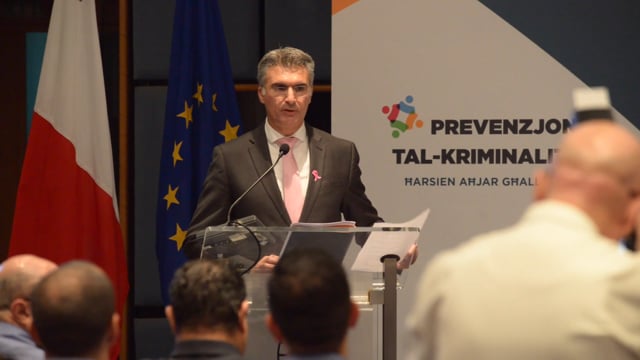[WATCH] Proposed family and education support for ‘crime families’ in Malta
A crime prevention strategy launched for public consultation proposes the setting up of a think-tank to draft an environmental crime prevention strategy


A national crime prevention strategy launched for public consultation has proposed the setting up of family and education support in localities that host “a concentration of crime families in Malta and Gozo”.
The support would include youth outreach, mental health services and family workshops amongst others.
The strategy defines crime families as one where at least two members have been imprisoned.
Janice Formosa Pace, appointed by the Home Affairs Minister Carmelo Abela to draft the strategy, argued that addressing crime families was pivotal: “Studies have shown that people from crime families are more likely to act violently.”

According to the strategy, Valletta, Bormla, Sant Lucia, San Lawrenz in Gozo, Isla, Floriana, Kalkara, Kirkop, Birgu and Pieta “host a concentration of crime families”.
The strategy goes on to propose nationwide hotlines and online platforms to help identify vulnerable children and other relatives of inmates previously unknown to national agencies.
The document, released today by Carmelo Abela, states that “certain neighbourhoods host a concentration of crime families and are characterised by social stigma and poverty pockets”. This, it is argued, calls for a re-thinking of policies related to neighbourhood factors and social housing in Malta.

In a bid to tackle this, it is proposed that geographers, criminologists, urban planners and the police come together to design an environmental crime prevention strategy.
The document also tackles the issue of under-reporting of sex offences, quoting studies that show that 85% of the time, people are highly unlikely to report such a situation should it arise. The proposals include a publicity campaign with a dual aim, that for victims to be more informed about their rights and available support systems, and that aimed at deterring offenders. “Provided that such campaigns are effective, it is envisaged that a number of offenders previously unknown to the criminal justice system would be identified and eventually, if there is enough evidence, prosecuted and convicted.”

In order to avoid re-victimisation, the strategy mentions the urgent standardisation of referral practices of support organisations. “It is pointless referring more people if the provision of support is hindered by lack of capacity and professionals.”
The proposals can be seen to focus on education, as can be seen from its references to pickpocketing. “The focus here is on equipping people with information that allows them to be prepared and proactive, but in no way causing moral panic so as not to elicit the fear of crime,” the document reads.
Addressing the launch, Abela said that the five-year strategy, covering 2017 – 2021, would offer better protection to the Maltese communities.
“The strategy will focus on the perpetrators, the victims and their families, and will be aided by a detailed analysis of dark figures of crime,” Abela said. He added Malta was one of few EU member states not to own such a strategy.
“We are moving towards being proactive, as opposed to reactive. It is time to take concrete actions and get the public to be active also.”
Referring to cybercrime, Abela argued that new crimes were emerging: “Sometimes crimes are faceless and even carried out overseas. The digital world has opened the door for more crimes related to paedophilia and sexual harassment, especially with younger people.
“This is why the fight against crime has become cooperative and borderless.”
Abela said that the proposals for consultation focus on reducing criminality and warding off recidivism. He added that different entities need to come together to work towards this goal, and urged the public to play their part.
“The creating of preventative measures is an ambitious goal. However, it is necessary to ensure that our community feels safe. This is why we are encouraging the public to contribute to this consultation period.”
The recommendations outlined in the document are based on six main areas: school-based prevention initiatives, the drafting of a Youth Justice Act, enhanced policing for Crime Prevention, and the identification of crime families.
The public consultation is open until 30 November.


.png)

.png)



.jpg)




.jpg)






.png)


